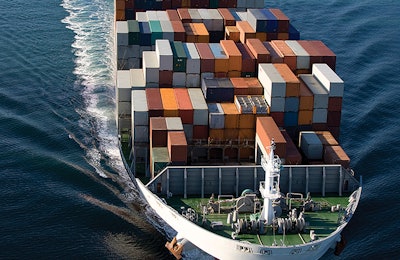
Critical defect in I-40 bridge shuts down automobile, river traffic
Barges hauling grain, animal feed and other goods on the Mississippi River are halted near Memphis after bridge inspection crews discovered a “critical” defect on May 11.
During a routine and scheduled inspection of the Hernando de Soto Bridge, inspectors discovered a “significant fracture in a steel beam that is crucial to the structural integrity of the I-40 Mississippi River bridge between West Memphis and Memphis,” according to Arkansas Department of Transportation Director Lorie Tudor. “This bridge is a vital link for freight between east and west of the Mississippi River. The Mississippi River is a waterway that is crucial to barge traffic and movement of commodities.”
Automobile traffic is shut down over the bridge in both directions. Officials said they had no estimate for when the bridge would reopen or when barge traffic on the Mississippi River would resume.
According to a report from the U.S. Coast Guard (USGC) the morning of May 13, 44 vessels with 709 barges were delayed after it closed the river to all vessel traffic between mile markers 736 and 737 on the Lower Mississippi River.
“The Coast Guard is currently working with Arkansas Department of Transportation, Tennessee Department of Transportation and river industry stakeholders on this developing situation,” said Capt. Ryan Rhodes, captain of the Port of Memphis, in a statement. “Based on the current information available, we have closed a portion of the Lower Mississippi River out of an abundance of caution. The captain of the port is monitoring the situation and will continue to ensure the safety of the maritime environment and surrounding community.”
In the week ending May 1, more than 430 barges moved south along the river, headed for the Gulf of Mexico, according to the U.S. Department of Agriculture, which adds that the majority of those barges were loaded north of Memphis.
“Most every barge loaded with soybeans, corn or other agricultural commodity along the upper Mississippi, Ohio, Illinois or Missouri rivers is destined to Gulf of Mexico export facilities near New Orleans and, therefore, must pass underneath the I-40 bridge,” said Mike Steenhoek, executive director of the Soy Transportation Coalition, in a report. “It is reasonable to assume hundreds of barges of U.S. grain will be negatively impacted by the closure depending on its duration. Because U.S. soybeans are primarily exported between the months of September and February, other commodities, particularly corn, will bear more of the brunt of the barge traffic suspension, but soybeans will clearly be impacted as well.”
According to reports, the bridge was last inspected less than two years ago. Additional inspections could take three to four days, officials said, but repairs could take months.
The discovery of the defect comes as President Joe Biden is making the case for his US$2 trillion infrastructure plan, also known as the American Jobs Plan, which would direct funding to bridge repairs, among other infrastructure improvements across the U.S.
Construction of the Hernando de Soto Bridge began in 1967 and it was opened to automobile traffic in 1973.











